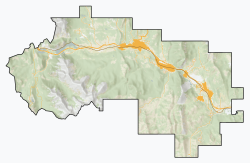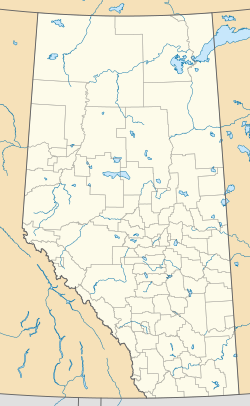Passburg, Alberta
 From Wikipedia - Reading time: 6 min
From Wikipedia - Reading time: 6 min
Passburg
Police Flats | |
|---|---|
| Coordinates: 49°33′25″N 114°20′24″W / 49.557°N 114.340°W | |
| Country | Canada |
| Province | Alberta |
| Specialized municipality | Crowsnest Pass |
| Government | |
| • Type | Unincorporated |
| • Governing body | Municipality of Crowsnest Pass Council |
| Time zone | UTC−7 (MST) |
| • Summer (DST) | UTC−6 (MDT) |
Passburg is a ghost town in the Municipality of Crowsnest Pass in southern Alberta, Canada that was formerly a coal mining community. It is on Highway 3 (the Crowsnest Highway) approximately 130 km (81 mi) west of Lethbridge and 4 km (2.5 mi) southeast of Bellevue.
History
[edit]| Year | Pop. | ±% |
|---|---|---|
| 1911 | 305 | — |
| Source: Statistics Canada[1] | ||
In the 1880s, the Passburg area was originally a haven for cattle rustlers and their stolen stock destined for the United States due to availability of grass, multiple water sources, and shelter.[2] In response, the North-West Mounted Police established a post in the area,[2] which then became known as Police Flats.[3]
William Hamilton founded the Leitch Collieries Ltd. Coal Company, also known as the Leitch Collieries Coal and Coke Company,[2] in the Police Flats area in 1907.[3] The first mine was developed at Byron Creek while the second mine was developed at Police Flats in 1909.[2] Above ground infrastructure to support mining activity included 101 coke ovens, a wooden washery that was 27 m (89 ft) in height, and a tipple that could process 1,000 to 2,000 tons of coal on a daily basis.[2]
A subdivision plan for the Passburg townsite was surveyed in August 1907.[4] The townsite, which was a kilometre west of the second mine, was intended to house the miners and their families.[2] The opening of a general store, another store, a bank, a hotel, a doctor's office, church, and meat market soon followed along with numerous homes.[3] Passburg's post office opened in one of its stores on June 1, 1908.[3] A sandstone power house was built at the second mine that began producing electricity for the townsite in 1910.[2] By the 1911 Census of Canada, the townsite grew to a population of 305.[1]
Strikes at Leitch Collieries occurred in 1909 and 1911.[2] The Great War weakened coal prices and prevented agreements to supply product to the United States, England, and the Balkans.[2] Relationships became strained with its financing banks and the Canadian Pacific Railway, which was both a customer and transporter of Leitch Collieries' products.[2] The company stopped production in 1915 and placed its assets up for sale.[2] After the death of a prospective buyer later in 1915, Leitch Collieries was unable to finance a restart of production despite the demand generated by the war.[2] The company sold off its assets in 1919.[2]
Passburg's post office closed in 1938.[3] The Leitch Collieries Provincial Historic Site was designated by the Government of Alberta in 1983.[5]
Attractions
[edit]The Leitch Collieries Provincial Historic Site is located north of Highway 3 (the Crowsnest Highway) east of East Hillcrest Drive between Burmis to the east and Bellevue to the northwest.[6] The site is self-guided from Labour Day to mid-May while interpretive staff lead tours during the balance of the year.[7]
Notable people
[edit]William Kovach, a member of the Legislative Assembly of Alberta between 1948 and 1966, was born in Passburg.[8]
See also
[edit]References
[edit]- ^ a b Fifth Census of Canada, 1911. Dominion Bureau of Statistics.
- ^ a b c d e f g h i j k l m "Facts: Leitch Collieries Provincial Historic Site" (PDF). Government of Alberta. Retrieved November 14, 2021.
- ^ a b c d e Crowsnest and Its People. Crowsnest Pass Historical Society. 1979. pp. 57 and 225–237. ISBN 0-88925-046-4.
- ^ "Passburg Townsite (Subdivision Plan 185AA)". Alberta Land Titles Office. August 28, 1907. Retrieved November 13, 2021.
- ^ "Leitch Collieries: About Leitch Collieries". Government of Alberta. Retrieved November 14, 2021.
- ^ "Leitch Collieries Provincial Historic Site". Google Maps. Retrieved November 14, 2021.
- ^ "Leitch Collieries: Plan Your Visit". Government of Alberta. Retrieved November 14, 2021.
- ^ "Alberta MLA Dies While On Fishing Trip". Vol LIX No. 199. Lethbridge Daily Herald. August 5, 1966. p. 1.
 KSF
KSF
